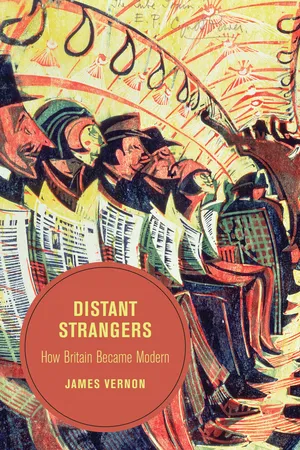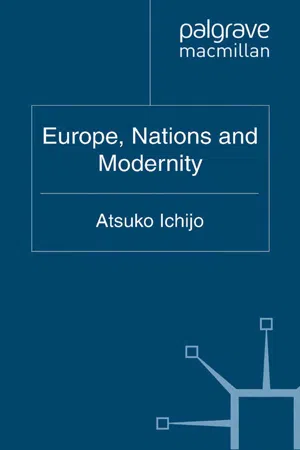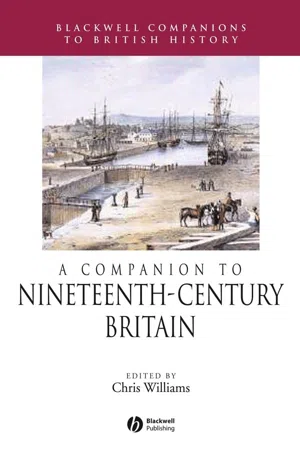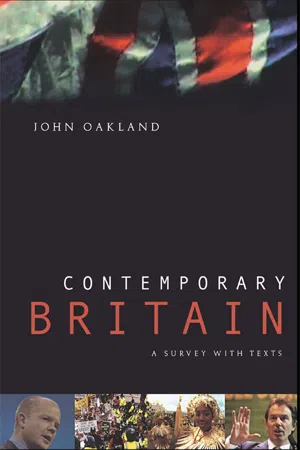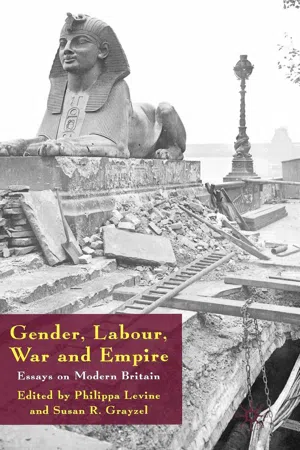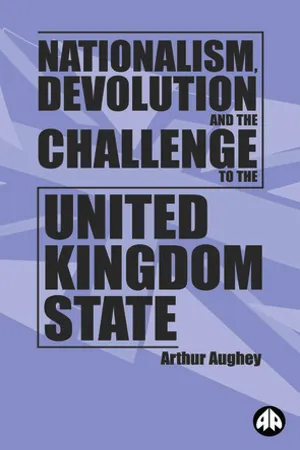History
Modern Britain
Modern Britain refers to the period from the late 19th century to the present day, characterized by significant social, political, and economic changes. This era saw the rise of industrialization, the expansion of the British Empire, two world wars, and the transformation of British society through movements such as feminism, civil rights, and LGBTQ+ rights.
Written by Perlego with AI-assistance
Related key terms
1 of 5
7 Key excerpts on "Modern Britain"
- eBook - PDF
Distant Strangers
How Britain Became Modern
- James Vernon(Author)
- 2014(Publication Date)
- University of California Press(Publisher)
My argument neither intends nor needs to provide a carica-ture of early modern societies as only rooted in local and personal rela-tions where everyone knew each other. Indeed, frequently I return the reader to the late seventeenth and early eighteenth centuries to trace the processes of change that made Britain modern. Nonetheless, I am insist-ent, some will find wearily so by the relentless flow of data, that, meas-ured both qualitatively and quantitatively, the nineteenth century (and more specifically the decades between 1830 and 1880) was the decisive moment of Britain’s great transformation. 29 There are those like Virginia Wolfe with hubris enough to identify a particular moment, in her case “on or about December 1910,” when the world cracks and begins anew. Historians are prone to do so by using revolutions—hence the ubiquity of 1789—to demarcate the break between the early and late modern peri-ods, but most recognize that even those dramatic events are part of longer processes of change. Certainly Britain did not become modern in a single decade, let alone a year, or month. The scale and nature of the great transformation was palpable in the 1830s, but it was not until the 1880s and often continuing deep in to the twentieth century that the new forms of social, political, and economic organization were naturalized. The important but not necessarily constitutive place of the British Empire in that transformation will, I hope, become self-evident in the following pages. Clearly I do not suggest that you need an empire to become modern. Britain’s imperial expansion played no part in the dra-matic and sustained expansion of its domestic population. Nonetheless, the flow of emigrants from Britain across the empire significantly extended that population’s mobility, while the size of the populations and territories colonized generated new problems of governing over and trading with distant strangers. - eBook - PDF
- A. Ichijo(Author)
- 2011(Publication Date)
- Palgrave Macmillan(Publisher)
These historians’ views were underpinned by what is called the Whig interpretation of history, which supports the claim for British British Case 219 exceptionalism and is characterised by the construction of the ‘we, the British’ and ‘them, the Europeans’ binary, as found in politicians’ utterances. There were also some economists – such as E J Michan of the London School of Economics and Political Science – who opposed British membership by refuting the supposed benefits of the Common Market. Political scientists – such as William Pickles of the London School of Economics – were against because of the concern over sover- eignty (Dewey 2009: ch.3). Since the mid-twentieth century, Britain has been seen as Eurosceptic but in intellectual circles, a different approach to ‘Europe’ has emerged. On the left wing, especially, ‘Europe’ is increasingly seen as a model against which one can measure British society’s progress and advance- ment, an intellectual shift that is also found in the political discourse of the nationalist parties in Scotland and Wales. On the right wing of politics, too, the elite has begun to take ‘Europe’ more seriously. It is no longer something ‘irrelevant’ but often seen as a threat to Britain’s identity. Both shifts can be understood as a response to the conditions of modernity – intensification of self-examination – though the forms it takes is by no means homogeneous. 9.4 British path to modernity and Whig history Within the context of investigating European identities in Britain, the most influential paradigm in explaining the modernisation of Britain is still ‘Whig history’ despite a great deal of criticism directed at it, mainly by postwar historians. 4 The label ‘Whig history’ was originally proposed by an eminent historian, Herbert Butterfield, in his seminal book, The Whig Interpretation of History , which first appeared in 1931. - eBook - PDF
- Chris Williams(Author)
- 2008(Publication Date)
- Wiley-Blackwell(Publisher)
It is a narrative that describes, in essence, the transformation of Britain from a predominantly rural and agricultural society to one that was largely town- or city-based and industrial. As such, its outline can be traced through a series of exemplary nineteenth-century texts, from William Cobbett’s Rural Rides (1816) to the fictional Coketown of Charles Dickens’s Hard Times (1854) and the metro-politan slums of Andrew Mearns’s The Bitter Cry of Outcast London (1883). Yet as twin leitmotifs of the history of nineteenth-century Britain, industrialization and urbanization have been viewed very differently in historiography since the 1980s. For while economic historians have depicted industrialization as a less radical process than the term Industrial Revolution suggested, occurring gradually over several centuries, recent social and cultural historians have tended to portray urbanization as, if anything, more sudden and dramatic in its consequences than had previously been assumed. The city was the fulcrum for the major changes overtaking British society in the nineteenth century; it was on the very cutting-edge of capitalism and modernity. Urban Britain has not remained immune from repeated shifts in historical inter-pretation; the growth of Victorian towns and cities and the manner in which they were experienced have been viewed in successively different ways over the last forty years. In the 1960s urban history took root and began to flourish in Britain, most famously under the inspiration of H. J. Dyos at Leicester University. Studying the built form and social ecology of towns and cities became an important project in its own right, as in Dyos’s pioneering study of Camberwell. 1 It also attracted social historians and historical geographers interested in specific urban locales, like Oldham and East London, as case studies for hypotheses about patterns of social and spatial formation in the past. - eBook - ePub
Contemporary Britain
A Survey With Texts
- John Oakland(Author)
- 2002(Publication Date)
- Routledge(Publisher)
Public opinion polls sometimes portray Britain as a society full of alleged weaknesses and worrying concerns. Politicians and commentators also often seem interested in presenting the country as a ‘problem’ (or a series of ‘problems’) and suggesting their own ‘remedies’, usually under the guise of ‘modernization’. But Britain is a generally equable society and most of its people seem to operate on established personal and social norms, conscious of both tradition and change. It is not a static country (in spite of the ‘conservative’ and ‘quaint’ images often attributed to it) and is subject to periods of transition, which inevitably involve a tension between past and present.However, since at least the 1960s, many critics have focused on ‘the state of Britain’ and have portrayed a country in decline on moral, social, political and economic grounds. In their view, the society continues to be unsure about itself and its identity, both nationally and internationally.Some observers have maintained that Britain needs fundamental structural reforms and attitudinal change in virtually every area of national life in order to remedy decline and embrace ‘modernization’. Other commentators have argued that evolutionary or gradualist change on pragmatic lines is required, which, as they see it, would be characteristic of British historical development. Nevertheless, on both sides, questions are asked about Britain’s future direction, its institutions, its place in Europe and the world and its status as a United Kingdom.The debates have often focused on macro or large-scale issues such as the weaknesses of the economic system, political and constitutional inadequacies, imperial decline, the alleged non-competitive nature of British society and the performance (or lack of it) of national institutions. Some texts in this chapter illustrate the economic arguments for decline and some stress cultural, institutional and democratic weaknesses. But others describe the vitality and variety of entrepreneurial activity and individual behaviour in British life, which are often expressed outside strict organizational or institutional restraints.In terms of ordinary Britons’ reactions to their society, certain issues, such as health, education and crime, continue to be of great concern and there is frequently a gap between what politicians propose and what the mass of the people find important or acceptable. In January 2000, the public opinion poll organization MORI1 - eBook - PDF
Gender, Labour, War and Empire
Essays on Modern Britain
- Philippa Levine, Susan R. Grayzel(Authors)
- 2008(Publication Date)
- Palgrave Macmillan(Publisher)
Profound social and cultural changes ushered in by the postwar welfare state and by the processes associated with decolo- nization further complicated notions of Britishness. The postwar era was not neatly "post-colonial", and nor did class lessen as a dividing line in British society. Recent works on the Mau Mau rebellion in Kenya have suggested that ceding control of African colonies was fraught.9 Inter- national incidents heralding Britain's loss of control over its "sphere of influence", whether in the Malayan Emergency of the late 1950s, the Suez Crisis of 1956 or Rhodesia's UDI almost a decade later, in conjunc- tion with the increasing presence of what were called "New Common- wealth" immigrants in the British Isles themselves, provoked intense discussion of who belonged to, and in, the post-imperial nation. 1o As a result, both Britain and Britishness are now seen as contested in ways that open up the field to fruitful new avenues of inquiry. II. New ways of thinking about gender, labour and war in Imperial Britain Given these major and rich developments, defining Britishness and the scope of modern British history has become increasingly complicated, but at the same time offers new opportunities to meet the intellectual and political challenges that accompany the changing nature of this scholarship. Tellingly, many of the chapters in this collection engage with the methodologies of cultural history, paying close attention to language, representation and such objects of mass culture as political rallies and demonstrations, fashion magazines and, in particular, cinema, that most modern of cultural practices. Contributors to an influential collection of essays published in 1999, Beyond the Cultural Tum - including those who work on Britain (such as Sonya Rose) - have argued for the importance of seeing how cultural practices intertwine with social ones in historically contingent settings. - Arthur Aughey(Author)
- 2001(Publication Date)
- Pluto Press(Publisher)
Yet history is what historians make of it and historians are bound by their own time and place. For Cannadine, the time and place of Britain at the end of the twentieth century meant ‘that we are burdened by the simple and sombre fact that the future of the British past looks bleaker today than at any time during the last forty years’ (1987, p. 169). His was a pessimistic meditation on the question ‘When was Britain?’. The state of the subject matched the subject of the state and both were in obvious crisis. ‘When was Britain?’ for Cannadine was the Britain created by historians within living memory, a certain idea of Britain fashioned in the self-confidence of the postwar decades. That history was not only exciting, it was also usable and relevant to a Britain embarking on the enterprise of building the Welfare State. And not only usable but lucrative. It sold well in an expanding academic market both at home and abroad. Understanding British history was the means by which a worldwide readership could understand how the modern world had come into being. Britain’s past was the workshop of world-historical significance. Its achievements had inaugurated the important ages of modernity. Britain was the first modern state-builder. It experienced the first bourgeois revolution, it generated the first industrial revolution and it was the first urbanised society. In the twentieth century, its parliamentary institutions had survived what Eric Hobsbawm called the age of extremes. In a striking phrase, Cannadine argued that ‘Britain’s past always seemed to be antici-pating the future’ (1987, p. 174). The contrast with its condition today could not be greater. British history, rather like the British motor car industry, no longer seemed capable of producing what the world market, or even the domestic market, wanted to buy. Britain was becoming again what it once was, a small off-shore island, a medium-sized power with limited ambitions and limited influence.- eBook - PDF
- Jeremy Black(Author)
- 2015(Publication Date)
- Bloomsbury Academic(Publisher)
CHAPTER FOUR Britain becomes the world power, 1750–1900 Between 1750 and 1900, Britain became the foremost power in the world, both territorially and in economic terms. An intel-lectual powerhouse, Britain also became a model political system for much of the world. These changes were interrelated, but the causal relationship is often unclear. Alongside an emphasis on British exceptionalism in change, it is possible to study aspects of the period that did not focus on the debate about change. It is also possible to consider the extent to which developments in Britain, including industrialisation, urbanisation and imperialism, were an aspect of a wider Western process. That was not, however, the general perception in Britain. There was a sense, instead, of the country as distinctive and foremost, and this sense has to be taken into account in assessing its history. Domestic politics generally takes second place to industrial transformation in any account of the key developments in the period. This emphasis is appropriate given the extent to which this transformation burst asunder the apparent nature of time as cyclical. Instead, industrial transformation made clear that the past would not recur. This transformation suggested, as a result, that arrangements based upon it and legitimated by long usage were no longer valid. Yet the importance of the politics of the period was that they helped make this transformation possible. Economic change led to major social pressures and large-scale disruption, but there was 92 A SHORT HISTORY OF BRITAIN no serious breakdown in social or political stability. In contrast to many Continental states, there was no revolution in Britain, either at the time of the French Revolutionary crisis at the close of the eighteenth century, or in the mid-nineteenth century when there were revolutions across the Continent. The years 1830 and 1848 were not years of revolution in Britain.
Index pages curate the most relevant extracts from our library of academic textbooks. They’ve been created using an in-house natural language model (NLM), each adding context and meaning to key research topics.
